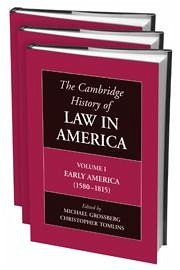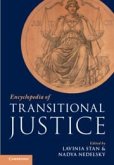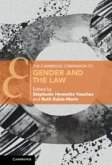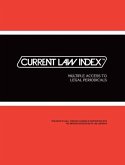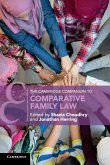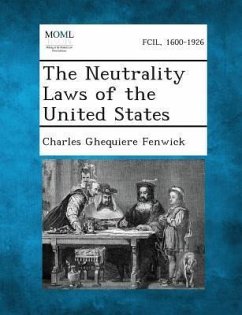Christopher Tomlins / Michael Grossberg
The Cambridge History of Law in America 3 Volume Hardback Set
Herausgeber: Grossberg, Michael; Tomlins, Christopher
Christopher Tomlins / Michael Grossberg
The Cambridge History of Law in America 3 Volume Hardback Set
Herausgeber: Grossberg, Michael; Tomlins, Christopher
- Broschiertes Buch
- Merkliste
- Auf die Merkliste
- Bewerten Bewerten
- Teilen
- Produkt teilen
- Produkterinnerung
- Produkterinnerung
Sixty leading law historians present a full account of the history of American law.
Andere Kunden interessierten sich auch für
![The Oliver Wendell Holmes Devise History of the Supreme Court of the United States 11 Volume Hardback Set The Oliver Wendell Holmes Devise History of the Supreme Court of the United States 11 Volume Hardback Set]() Julius Goebel JrThe Oliver Wendell Holmes Devise History of the Supreme Court of the United States 11 Volume Hardback Set2.080,99 €
Julius Goebel JrThe Oliver Wendell Holmes Devise History of the Supreme Court of the United States 11 Volume Hardback Set2.080,99 €![Encyclopedia of Transitional Justice 3 Volume Hardback Set Encyclopedia of Transitional Justice 3 Volume Hardback Set]() Encyclopedia of Transitional Justice 3 Volume Hardback Set554,99 €
Encyclopedia of Transitional Justice 3 Volume Hardback Set554,99 €![The Cambridge Companion to Gender and the Law The Cambridge Companion to Gender and the Law]() The Cambridge Companion to Gender and the Law44,99 €
The Cambridge Companion to Gender and the Law44,99 €![Current Law Index Current Law Index]() Current Law Index2.430,99 €
Current Law Index2.430,99 €![The Cambridge Companion to Comparative Family Law The Cambridge Companion to Comparative Family Law]() The Cambridge Companion to Comparative Family Law40,99 €
The Cambridge Companion to Comparative Family Law40,99 €![Virginia Hasn't Always Been for Lovers: Interracial Marriage Bans and the Case of Richard and Mildred Loving Virginia Hasn't Always Been for Lovers: Interracial Marriage Bans and the Case of Richard and Mildred Loving]() Phyl NewbeckVirginia Hasn't Always Been for Lovers: Interracial Marriage Bans and the Case of Richard and Mildred Loving22,99 €
Phyl NewbeckVirginia Hasn't Always Been for Lovers: Interracial Marriage Bans and the Case of Richard and Mildred Loving22,99 €![The Neutrality Laws of the United States The Neutrality Laws of the United States]() Charles Ghequiere FenwickThe Neutrality Laws of the United States28,99 €
Charles Ghequiere FenwickThe Neutrality Laws of the United States28,99 €-
-
-
Sixty leading law historians present a full account of the history of American law.
Hinweis: Dieser Artikel kann nur an eine deutsche Lieferadresse ausgeliefert werden.
Hinweis: Dieser Artikel kann nur an eine deutsche Lieferadresse ausgeliefert werden.
Produktdetails
- Produktdetails
- Verlag: Cambridge University Press
- Seitenzahl: 2624
- Erscheinungstermin: 21. April 2008
- Englisch
- Abmessung: 474mm x 408mm x 66mm
- Gewicht: 3949g
- ISBN-13: 9780521803045
- ISBN-10: 0521803047
- Artikelnr.: 23438143
- Herstellerkennzeichnung
- Libri GmbH
- Europaallee 1
- 36244 Bad Hersfeld
- gpsr@libri.de
- Verlag: Cambridge University Press
- Seitenzahl: 2624
- Erscheinungstermin: 21. April 2008
- Englisch
- Abmessung: 474mm x 408mm x 66mm
- Gewicht: 3949g
- ISBN-13: 9780521803045
- ISBN-10: 0521803047
- Artikelnr.: 23438143
- Herstellerkennzeichnung
- Libri GmbH
- Europaallee 1
- 36244 Bad Hersfeld
- gpsr@libri.de
Michael Grossberg is the Sally M. Reahard Professor of History and a Professor of Law at Indiana University, where he is also co-director of the Indiana University Center on Law, Society, and Culture. He is the author of numerous articles and books, including Governing the Hearth, Law, and the Family in Nineteenth-Century America, winner of the American Historical Association's 1985 Littleton-Griswold Prize. His research focuses on the relationship between law and social change, particularly the intersection of law and the family.
Christopher Tomlins is Senior Research Fellow at the American Bar Foundation in Chicago. Among other books, he is author of Law, Labor and Ideology in the Early American Republic, winner of the James Willard Hurst book prize of the Law and Society Association and of the American Historical Association's Littleton-Griswold prize, both in 1994. His research encompasses the relationship between labor, colonization, and law in early America, the history of the concept of police in Anglo-American law and politics and the historical interactions of law and social science.
Christopher Tomlins is Senior Research Fellow at the American Bar Foundation in Chicago. Among other books, he is author of Law, Labor and Ideology in the Early American Republic, winner of the James Willard Hurst book prize of the Law and Society Association and of the American Historical Association's Littleton-Griswold prize, both in 1994. His research encompasses the relationship between labor, colonization, and law in early America, the history of the concept of police in Anglo-American law and politics and the historical interactions of law and social science.
Volume 1. Law, colonization, legitimation and the European background
2. The law of Native Americans to 1815
3. English settlement and local governance
4. Legal communications and imperial governance: British North America and Spanish America compared
5. Regionalism in early American law
6. Penality and the colonial project: crime, punishment and the regulation of morals in early America
7. Law, population, labor
8. The fragmented laws of slavery in the colonial and revolutionary eras
9. The transformation of domestic law
10. Law and religion in colonial America
11. The transformation of law and economy in early America
12. Law and commerce, 1580-1815
13. Law and the origins of the American Revolution
14. Confederation and constitution
15. The consolidation of the early Federal system, 1791-1812
16. Magistrates, common law lawyers, legislators: the three legal systems of British America. Volume 2. 1. Law and the American state, from the Revolution to the Civil War: institutional growth and structural change
2. Legal education and legal thought, 1790-1920
3. The legal profession: from the Revolution to the Civil War
4. The courts, 1790-1920
5. Criminal justice in the United States, 1790-1920: a government of laws or men?
6. Citizenship and immigration law, 1800-1924: resolutions of membership and territory
7. Federal policy, Western movement and consequences for indigenous people, 1790-1920
8. Marriage and domestic relations
9. Slavery, antislavery, and the coming of the Civil War
10. The civil war and reconstruction
11. Law, personhood and citizenship in the long nineteenth century: the borders of belonging
12. Law in popular culture, 1790-1920: the people and the law
13. Law and religion, 1790-1920
14. Legal innovation and market capitalism, 1790-1920
15. Innovations in law and technology, 1790-1920
16. The laws of industrial organization, 1870-1920
17. The military in American legal history
18. The United States and international affairs, 1789-1919
19. Politics, state building, and the courts, 1870-1920. Volume 3. 1. Law and state, 1920-2000: institutional growth and structural change
2. Legal theory and legal education, 1920-2000
3. The American legal profession, 1870-2000
4. The courst, Federalism and the Federal Constitution, 1920-2000
5. The litigation revolution
6. Criminal justice in the United States
7. Law and medicine
8. The Great Depression and the New Deal
9. Labor's welfare state: defining workers, constructing citizens
10. Poverty law and income support: from the progressive era to the war on welfare
11. The rights revolution in the twentieth century
12. Race and rights
13. Heterosexuality as a legal regime
14. Law and the environment
15. Agriculture and the state, 1789-2000
16. Law and economic change during the short twentieth century
17. The corporate economy: ideologies of regulation and antitrust, 1920-2000
18. Law and commercial popular culture in the twentieth-century United States
19. Making law, making war, making America
20. Law, lawyers and empire.
2. The law of Native Americans to 1815
3. English settlement and local governance
4. Legal communications and imperial governance: British North America and Spanish America compared
5. Regionalism in early American law
6. Penality and the colonial project: crime, punishment and the regulation of morals in early America
7. Law, population, labor
8. The fragmented laws of slavery in the colonial and revolutionary eras
9. The transformation of domestic law
10. Law and religion in colonial America
11. The transformation of law and economy in early America
12. Law and commerce, 1580-1815
13. Law and the origins of the American Revolution
14. Confederation and constitution
15. The consolidation of the early Federal system, 1791-1812
16. Magistrates, common law lawyers, legislators: the three legal systems of British America. Volume 2. 1. Law and the American state, from the Revolution to the Civil War: institutional growth and structural change
2. Legal education and legal thought, 1790-1920
3. The legal profession: from the Revolution to the Civil War
4. The courts, 1790-1920
5. Criminal justice in the United States, 1790-1920: a government of laws or men?
6. Citizenship and immigration law, 1800-1924: resolutions of membership and territory
7. Federal policy, Western movement and consequences for indigenous people, 1790-1920
8. Marriage and domestic relations
9. Slavery, antislavery, and the coming of the Civil War
10. The civil war and reconstruction
11. Law, personhood and citizenship in the long nineteenth century: the borders of belonging
12. Law in popular culture, 1790-1920: the people and the law
13. Law and religion, 1790-1920
14. Legal innovation and market capitalism, 1790-1920
15. Innovations in law and technology, 1790-1920
16. The laws of industrial organization, 1870-1920
17. The military in American legal history
18. The United States and international affairs, 1789-1919
19. Politics, state building, and the courts, 1870-1920. Volume 3. 1. Law and state, 1920-2000: institutional growth and structural change
2. Legal theory and legal education, 1920-2000
3. The American legal profession, 1870-2000
4. The courst, Federalism and the Federal Constitution, 1920-2000
5. The litigation revolution
6. Criminal justice in the United States
7. Law and medicine
8. The Great Depression and the New Deal
9. Labor's welfare state: defining workers, constructing citizens
10. Poverty law and income support: from the progressive era to the war on welfare
11. The rights revolution in the twentieth century
12. Race and rights
13. Heterosexuality as a legal regime
14. Law and the environment
15. Agriculture and the state, 1789-2000
16. Law and economic change during the short twentieth century
17. The corporate economy: ideologies of regulation and antitrust, 1920-2000
18. Law and commercial popular culture in the twentieth-century United States
19. Making law, making war, making America
20. Law, lawyers and empire.
Volume 1. Law, colonization, legitimation and the European background
2. The law of Native Americans to 1815
3. English settlement and local governance
4. Legal communications and imperial governance: British North America and Spanish America compared
5. Regionalism in early American law
6. Penality and the colonial project: crime, punishment and the regulation of morals in early America
7. Law, population, labor
8. The fragmented laws of slavery in the colonial and revolutionary eras
9. The transformation of domestic law
10. Law and religion in colonial America
11. The transformation of law and economy in early America
12. Law and commerce, 1580-1815
13. Law and the origins of the American Revolution
14. Confederation and constitution
15. The consolidation of the early Federal system, 1791-1812
16. Magistrates, common law lawyers, legislators: the three legal systems of British America. Volume 2. 1. Law and the American state, from the Revolution to the Civil War: institutional growth and structural change
2. Legal education and legal thought, 1790-1920
3. The legal profession: from the Revolution to the Civil War
4. The courts, 1790-1920
5. Criminal justice in the United States, 1790-1920: a government of laws or men?
6. Citizenship and immigration law, 1800-1924: resolutions of membership and territory
7. Federal policy, Western movement and consequences for indigenous people, 1790-1920
8. Marriage and domestic relations
9. Slavery, antislavery, and the coming of the Civil War
10. The civil war and reconstruction
11. Law, personhood and citizenship in the long nineteenth century: the borders of belonging
12. Law in popular culture, 1790-1920: the people and the law
13. Law and religion, 1790-1920
14. Legal innovation and market capitalism, 1790-1920
15. Innovations in law and technology, 1790-1920
16. The laws of industrial organization, 1870-1920
17. The military in American legal history
18. The United States and international affairs, 1789-1919
19. Politics, state building, and the courts, 1870-1920. Volume 3. 1. Law and state, 1920-2000: institutional growth and structural change
2. Legal theory and legal education, 1920-2000
3. The American legal profession, 1870-2000
4. The courst, Federalism and the Federal Constitution, 1920-2000
5. The litigation revolution
6. Criminal justice in the United States
7. Law and medicine
8. The Great Depression and the New Deal
9. Labor's welfare state: defining workers, constructing citizens
10. Poverty law and income support: from the progressive era to the war on welfare
11. The rights revolution in the twentieth century
12. Race and rights
13. Heterosexuality as a legal regime
14. Law and the environment
15. Agriculture and the state, 1789-2000
16. Law and economic change during the short twentieth century
17. The corporate economy: ideologies of regulation and antitrust, 1920-2000
18. Law and commercial popular culture in the twentieth-century United States
19. Making law, making war, making America
20. Law, lawyers and empire.
2. The law of Native Americans to 1815
3. English settlement and local governance
4. Legal communications and imperial governance: British North America and Spanish America compared
5. Regionalism in early American law
6. Penality and the colonial project: crime, punishment and the regulation of morals in early America
7. Law, population, labor
8. The fragmented laws of slavery in the colonial and revolutionary eras
9. The transformation of domestic law
10. Law and religion in colonial America
11. The transformation of law and economy in early America
12. Law and commerce, 1580-1815
13. Law and the origins of the American Revolution
14. Confederation and constitution
15. The consolidation of the early Federal system, 1791-1812
16. Magistrates, common law lawyers, legislators: the three legal systems of British America. Volume 2. 1. Law and the American state, from the Revolution to the Civil War: institutional growth and structural change
2. Legal education and legal thought, 1790-1920
3. The legal profession: from the Revolution to the Civil War
4. The courts, 1790-1920
5. Criminal justice in the United States, 1790-1920: a government of laws or men?
6. Citizenship and immigration law, 1800-1924: resolutions of membership and territory
7. Federal policy, Western movement and consequences for indigenous people, 1790-1920
8. Marriage and domestic relations
9. Slavery, antislavery, and the coming of the Civil War
10. The civil war and reconstruction
11. Law, personhood and citizenship in the long nineteenth century: the borders of belonging
12. Law in popular culture, 1790-1920: the people and the law
13. Law and religion, 1790-1920
14. Legal innovation and market capitalism, 1790-1920
15. Innovations in law and technology, 1790-1920
16. The laws of industrial organization, 1870-1920
17. The military in American legal history
18. The United States and international affairs, 1789-1919
19. Politics, state building, and the courts, 1870-1920. Volume 3. 1. Law and state, 1920-2000: institutional growth and structural change
2. Legal theory and legal education, 1920-2000
3. The American legal profession, 1870-2000
4. The courst, Federalism and the Federal Constitution, 1920-2000
5. The litigation revolution
6. Criminal justice in the United States
7. Law and medicine
8. The Great Depression and the New Deal
9. Labor's welfare state: defining workers, constructing citizens
10. Poverty law and income support: from the progressive era to the war on welfare
11. The rights revolution in the twentieth century
12. Race and rights
13. Heterosexuality as a legal regime
14. Law and the environment
15. Agriculture and the state, 1789-2000
16. Law and economic change during the short twentieth century
17. The corporate economy: ideologies of regulation and antitrust, 1920-2000
18. Law and commercial popular culture in the twentieth-century United States
19. Making law, making war, making America
20. Law, lawyers and empire.

